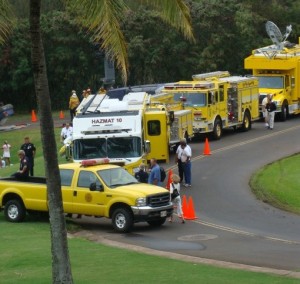Minimizing Impacts of Maui Brush Fire Season
By Wendy Osher
The Brush fire season on Maui is in full swing, prompting some reminders from the Maui Fire Department (MFD) on safety and prevention.
Maui Fire inspectors Kapono Stupplebeen and Larry Crilley today released a list of actions that can be taken by residents who live in high-risk brush fire areas. A first step, they say, is to minimize potential fuel sources by getting rid of bushes, tress, high grass, weeds and dead leaves near homes.
The “defensible space” or cleared area, helps to reduce the threat of wildfire, and provides an opportunity for firefighters to better defend a home from a brush fire threat. The suggested area to be cleared is at least 30-feet, particularly for homes located along the wildland urban interface, where residential communities or businesses are built in close proximity to fields or forested areas.
To create a Defensible Space, homeowners can start by taking the following steps:
- Thinning and trimming trees, brush and grass.
- Removing cut and dried vegetation like grass, leaves and branches.
- Keeping tree branches trimmed back from roof line, and 10 feet away from outlets of chimneys. Low branches should be trimmed up to 6 feet.
- Using plants native to the area or with a high moisture content instead of plants with oily resins.
- NOT storing boxes or large amounts of combustible items under the eaves or overhangs. These materials provide a fuel source that burns under the most vulnerable part of the structure.
Fire inspectors Stupplebeen and Crilley say the second step is to have a plan. This includes mapping out several different ways to evacuate from the neighborhood, and having an evacuation kit ready and accessible to grab on the run. Suggested items in the kit include the following:
- A supply of water.
- A supply of non-perishable packaged or canned food and a non-electric can opener.
- A change of clothing, rain gear and sturdy shoes.
- Blankets or sleeping bags.
- A first aid kit and prescription medications.
- An extra pair of glasses.
- A battery powered radio, flash light and plenty of extra batteries.
- Credit cards and cash.
- An extra set of car keys.
- A list of physicians.
- A list of important family information; the style and serial number of medical devices such as pace makers. Don’t forget special items for infants, elderly or disabled family members.











